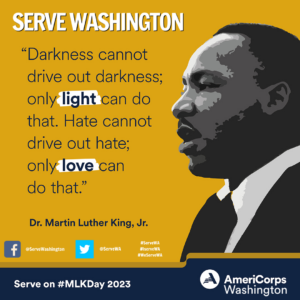Volunteer to Serve Your Community on MLK Day

By Julie Hyde, ICSEW Communications Subcommittee
Editor’s note: This article originally appeared in the Department of Health’s employee bulletin
The Martin Luther King, Jr. National Day of Service is Monday, Jan. 16, 2023.
Dr. King believed everyone has the power to build bridges and heal divides through service. The MLK National Day of Service calls upon us to honor his legacy through acts of service.
Volunteerism makes a difference! Volunteerism is a DOH value in action by showing others we care about them, seeing them as people who matter like we do, and taking into account their needs, challenges, contributions, and objectives. It builds trust, transforms neighborhoods, and creates caring communities, thus improving the conditions that influence health and well-being for all.
Former president Bill Clinton said, "Volunteering is an act of heroism on a grand scale. And it matters profoundly. It does more than help people beat the odds; it changes the odds."
Did you know that volunteerism also improves the life and health of the volunteer? See Benefit 2: Volunteering is good for your mind and body.
Dr. King himself said, "Anybody can serve. You don’t have to have a college degree to serve. You don’t have to make your subject and your verb agree to serve. You don’t have to know the second theory of thermodynamics in physics to serve. You only need a heart full of grace. A soul generated by love." He asked, "Life’s most persistent and urgent question is, what are you doing for others?"
This Jan. 16, let's challenge ourselves to join a service project or event in our communities. Many can be found by searching the internet for "volunteer opportunities near me."
Here are just a few for inspiration:
Serve Washington
https://servewashington.galaxydigital.com/for-volunteers-find-your-opportunity/
Serve Washington has also compiled a list of easy service projects you can do by yourself or in groups.
Volunteer Match
https://www.volunteermatch.org/
All Kids Win
https://allkidswin.org/get-involved/
United Way
https://www.unitedway.org/get-involved/volunteer
I will be making hearts for the 1000 Hearts Global Kindness community project. What Will You Do?
Benefit 2: Volunteering is good for your mind and body
Volunteering provides many benefits to both mental and physical health.
Volunteering helps counteract the effects of stress, anger, and anxiety. The social contact aspect of helping and working with others can have a profound effect on your overall psychological well-being. Nothing relieves stress better than a meaningful connection to another person. Working with pets and other animals has also been shown to improve mood and reduce stress and anxiety.
Volunteering combats depression. Volunteering keeps you in regular contact with others and helps you develop a solid support system, which in turn protects you against depression.
Volunteering makes you happy. By measuring hormones and brain activity, researchers have discovered that being helpful to others delivers immense pleasure. Human beings are hard-wired to give to others. The more we give, the happier we feel.
Volunteering increases self-confidence. You are doing good for others and the community, which provides a natural sense of accomplishment. Your role as a volunteer can also give you a sense of pride and identity. And the better you feel about yourself, the more likely you are to have a positive view of your life and future goals.
Volunteering provides a sense of purpose. Older adults, especially those who have retired or lost a spouse, can find new meaning and direction in their lives by helping others. Whatever your age or life situation, volunteering can help take your mind off your own worries, keep you mentally stimulated, and add more zest to your life.
Volunteering helps you stay physically healthy. Studies have found that those who volunteer have a lower mortality rate than those who do not. Older volunteers tend to walk more, find it easier to cope with everyday tasks, are less likely to develop high blood pressure, and have better thinking skills. Volunteering can also lessen symptoms of chronic pain and reduce the risk of heart disease.

